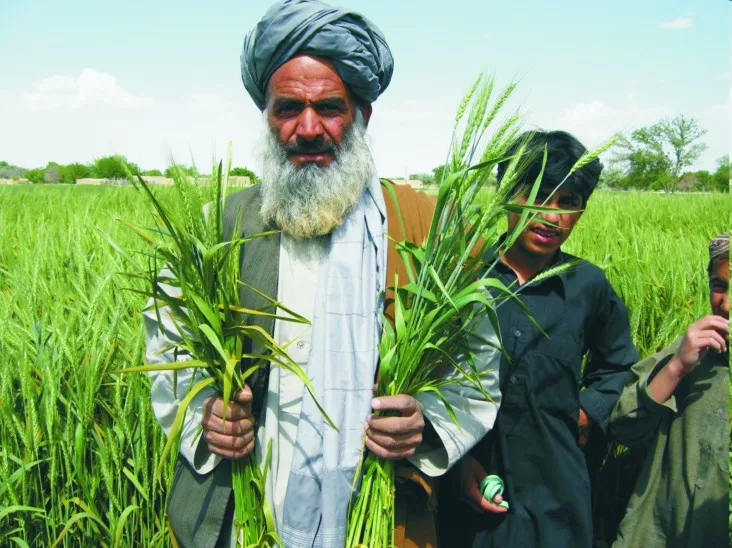
Photo credit : US AID
In the fertile plains of Pakistan, a flourishing agricultural sector pulses with vitality. However, a persistent disparity casts a substantial shadow on its potential. Despite numerous financial support initiatives, a considerable number of small-scale farmers, particularly women, find themselves marginalized on the outskirts of financial inclusion. This stark disconnection between fiscal resources and rural Pakistan not only hampers individual opportunities but also jeopardizes the nation’s agricultural progress and future food security.
The financial landscape supporting agriculture is undoubtedly extensive, featuring a diverse array of 52 institutions, ranging from established commercial banks to specialized microfinance entities and Islamic banking solutions. Tailor-made solutions abound, providing farmers with long-term credit for essential irrigation infrastructure and flexible loan schedules aligned with harvest cycles. Specialized products cater to livestock and poultry ventures, while innovative schemes like Electronic Warehouse Receipt Financing (EWRF) leverage stored produce as collateral, opening doors to formal bank loans.
The State Bank of Pakistan (SBP) plays a crucial role as the architect of agricultural finance, constructing a robust framework built on five pillars. This strategic approach fosters a supportive environment for farmers, diversifies lending portfolios, and champions innovative financing methods. The SBP leads groundbreaking initiatives like value chain financing, concessional schemes for priority areas, and credit guarantees for small-scale farmers. These efforts empower farmers through financial literacy programs and strengthen the capabilities of financial institutions.
Despite these significant measures, a glaring inequality persists, especially for women. A mere 13% of Pakistani women have bank accounts, underscoring the nation’s struggle with female financial inclusion. This gap is further magnified by various challenges, including reliance on male family members for financial transactions, limited digital literacy, and ingrained societal biases restricting their autonomy and access to land ownership.
Beyond mere statistics, the challenges faced by small-scale farmers, particularly women, are deeply rooted. Inadequate collateral forces them toward informal lenders charging exorbitant interest rates, trapping them in cycles of debt. Procuring essential agricultural supplies becomes an arduous battle, often necessitating reliance on black markets where inflated prices prevail. Intermediaries exploit this vulnerability, extending loans for critical inputs at predatory rates and subsequently coercing farmers into selling their produce back to them, perpetuating an economically disadvantageous cycle.
Rural communities, primarily engaged in cash-based economies and barter systems, remain distant from formal financial structures. Limited awareness of formal financial services, coupled with a deep-seated mistrust of financial institutions, further isolates farmers from these beneficial systems. Additionally, dependence on intermediaries who dictate prices and claim substantial profits significantly diminishes farmers’ earnings, restricting their economic potential. Inadequate storage facilities and limited market insights exacerbate these challenges, contributing to post-harvest losses and further eroding their hard-earned returns.
Realizing the full potential of Pakistan’s agricultural sector requires a multifaceted approach that prioritizes inclusion and equity. Tailored financial solutions designed for the specific needs of small-scale farmers and women are paramount. Microloans, integration of mobile banking, and gender-sensitive financial products can empower them to invest in their farms and gain greater control over their livelihoods. Educational initiatives and community partnerships can foster financial literacy and build trust in formal systems, equipping farmers to make informed decisions and navigate the complexities of finance.
Modernization efforts must take center stage. Public-private partnerships play a pivotal role in providing farmers with the tools and technologies they need to succeed. Initiatives focused on doorstep input delivery, farm mechanization, and streamlined product collection processes can eliminate exploitative intermediaries and ensure fair market access for all.
Policy reforms are equally essential. Digitizing land records and streamlining loan procedures can significantly improve accessibility for rural populations, removing obstacles and promoting participation. Strengthening legal frameworks that protect women’s land ownership rights and addressing discriminatory norms through community education and awareness campaigns are critical steps towards achieving an equitable agricultural landscape.
Financial inclusion in Pakistan’s agricultural sector promises transformative rewards, extending far beyond merely bridging gaps. Empowered farmers, particularly women, can invest in better resources and technologies, enhancing productivity and ensuring food security for the nation. Financial inclusion also strengthens risk management for farmers, providing insurance against unforeseen circumstances and fostering stability. Furthermore, financial access encourages farmers’ involvement in formal markets, ensuring fair pricing and economic independence. Bridging the rural-urban digital divide through internet access and digital literacy training strengthens market linkages and unlocks the potential of e-commerce platforms, further bolstering farmers’ earnings.
Investing in an inclusive agricultural landscape is not simply a financial imperative; it’s a social and ethical obligation. By tailoring financial solutions, promoting education and partnerships, and implementing transformative policy reforms, Pakistan can cultivate a future where every farmer, regardless of gender or social background, has the opportunity to thrive. This inclusive approach offers not only economic prosperity but also strengthens social fabric, promotes gender equality, and empowers rural communities to become active participants in the nation’s development journey.
